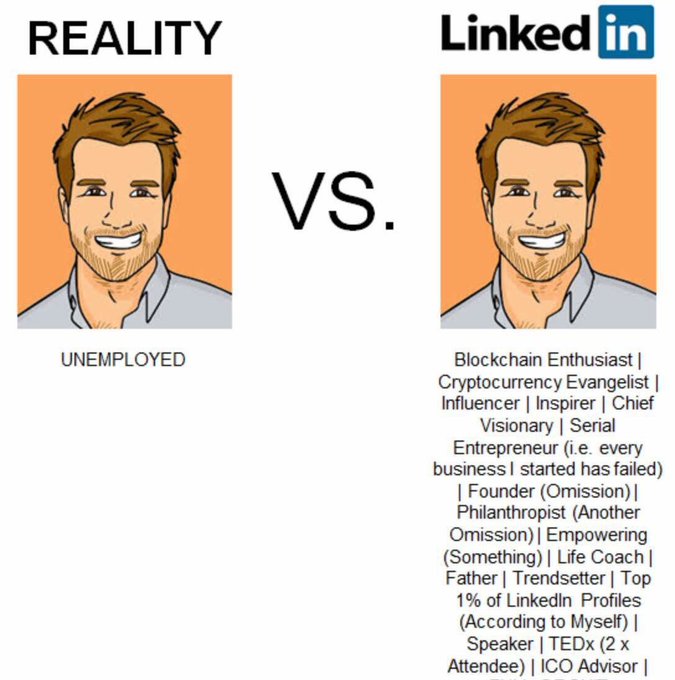#CareerAdvice : #JobSearch -This is the Easiest Way to Make your #LinkedInProfile Stand Out…One Small Tweak can Make a Big Difference.
Whenever I deliver my LinkedIn workshop, I get a lot of pushback on the following point: How to write your headline on the social network.
A LinkedIn headline is the line directly under your name–on your profile page, in the sidebar of people similar to you, and what people see in search results when they type your name. It’s the thing that people view the most after your name and headshot.
But most people don’t exploit this opportunity. Instead, they fall back on LinkedIn’s default settings–which copy and paste your job title and employer into this critical field.
A JOB TITLE TELLS YOU NOTHING
My “official” title is president of the Jonathan Rick Group. But if I’d put that on my LinkedIn headline, most people will probably look at it and have no idea what that means.
Sure, the word “president” may be impressive, but it doesn’t give you any clue about what the job involves or what I can do for you. As much as I’d love to flatter myself, it’s unlikely that a prospective client would see the headline, “JRG president,” and instantly think, “This guy can solve all my digital marketing needs!”
I’d go so far as to say that the same thing would apply to my previous jobs, such as “senior strategist at Rock Creek Strategic Marketing,” and “senior consultant at Booz Allen Hamilton.” You may have heard of Booz Allen, but unless you’re a senior consultant at Booz Allen, you probably have no idea what my responsibilities looked like.
There’s a simple solution to this–customize your headline. Instead of meekly recording your title and company, try following the tried-and-true strategy of describing what you do and who you help. This is your elevator pitch in 120 characters.
Here are a few examples:
- I help trade associations raise mountains of money.
- I help Fortune 500 CEOs and tech entrepreneurs navigate and influence Washington, D.C.
- Whatever the subject, I’ll make your message UBER: Understood, Believed, Enjoyed, and Remembered.
Earlier, I said that some folks rebel at the idea of a personalized headline. Let’s review their four strongest objections.
1. “MOST PEOPLE DON’T CUSTOMIZE THEIR HEADLINE”
This is true–but it’s because most people don’t know any better, just like they might not know the difference between a hashtag and a handle.
Like this Article ? Share It ! You now can easily enjoy/follow/share Today our Award Winning Articles/Blogs with Now Over 2.5 Million Growing Participates Worldwide in our various Social Media formats below:
FSC LinkedIn Network: www.linkedin.com/in/fscnetwork
Facebook: http://www.facebook.com/pages/First-Sun-Consulting-LLC-Outplacement-Services/213542315355343?sk=wall
Google+: https://plus.google.com/115673713231115398101/posts?hl=en
Twitter: Follow us @ firstsunllc
Question: Want the ‘the best/current articles/blogs on the web’ on Job Search, Resume, Advancing/Changing your Career, or simply Managing People?
Answer: Simply go to our FSC Career Blog below & type(#career, #leadership, #life) in Blog Search: https://www.firstsun.com/fsc-career-blog/
What Skill Sets do You have to be ‘Sharpened’ ?
Continue of article:
2. “A CUSTOM HEADLINE TYPICALLY MEANS THE HEADLINER IS UNEMPLOYED”
Yes, plenty of people position themselves as consultants when in fact, they aspire to be consultants. An image I recently saw on Twitter captures the point poetically.
3. “THEY’RE TOO FLOWERY”
I’ve also heard plenty of people claiming that while a custom headline may be a good idea, in theory, people use it in off-putting ways. In short, they think that these made-up banners are too flowery or pretentious–and often both.
Again, I sympathize with this viewpoint. But just because someone else’s headline is fluffy doesn’t mean your headline needs to be. I’ve long railed against what I call the “laundry listers” (who can’t decide who they are, so they throw in everything) and the “keyword stuffers” (who use jargon instead of English to seduce the algorithms).
Here are some examples of a straightforward and not flowery headline:
- Public policy advocate for the greater protection of our civil liberties
- Licensed mental health social worker, treating trichotillomania and OCD
- CPA, with 20 years of experience, specializing in real estate
To me, these lines sound far more intriguing and substantive than an unclear job title at a company people might or might not have heard of.
4. “I WORKED HARD TO GET HERE”
This objection seems to be one that people are extremely passionate about. If the first thing someone learns about me is that that I work at, say, the White House, he’s more likely to browse through my profile than if he sees I work at the White Group.
People argue that if they spend their days at a prestigious place, they shouldn’t obscure this accomplishment. After all, it takes talent to land at Goldman Sachs or Google, and isn’t LinkedIn all about showcasing that?
There are two issues here–one technical and one philosophical. Both revolve around prioritization.
The thing is, a custom headline doesn’t replace your title and company. The latter still very much forms part of your profile, at the top of your “experience” section. They’re just not the first thing people see.
When you value the institution over the individual, you also convey your insecurity. This mind-set suggests that you tie your professional identity to the company you work for, and that where you work is more important than what you do.
Instead of yoking yourself to your employer, cultivate your own identity. Recognize that your worth doesn’t require external validation. Your business card doesn’t bind you. It’s great to say, “I went to Harvard,” and that’s definitely something you should be proud of. But don’t let it define you. You’re much more valuable than that.
Author: Jonathan Rick is the president of the Jonathan Rick Group, a consultancy that helps people overhaul and optimize their LinkedIn profile. Follow him on Twitter at @jrick, where he tweets about the latest tricks in professional branding.
FastCompany.com | October 21, 2018












